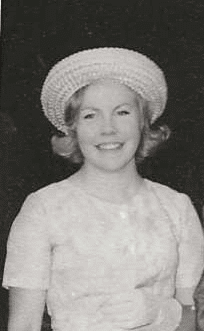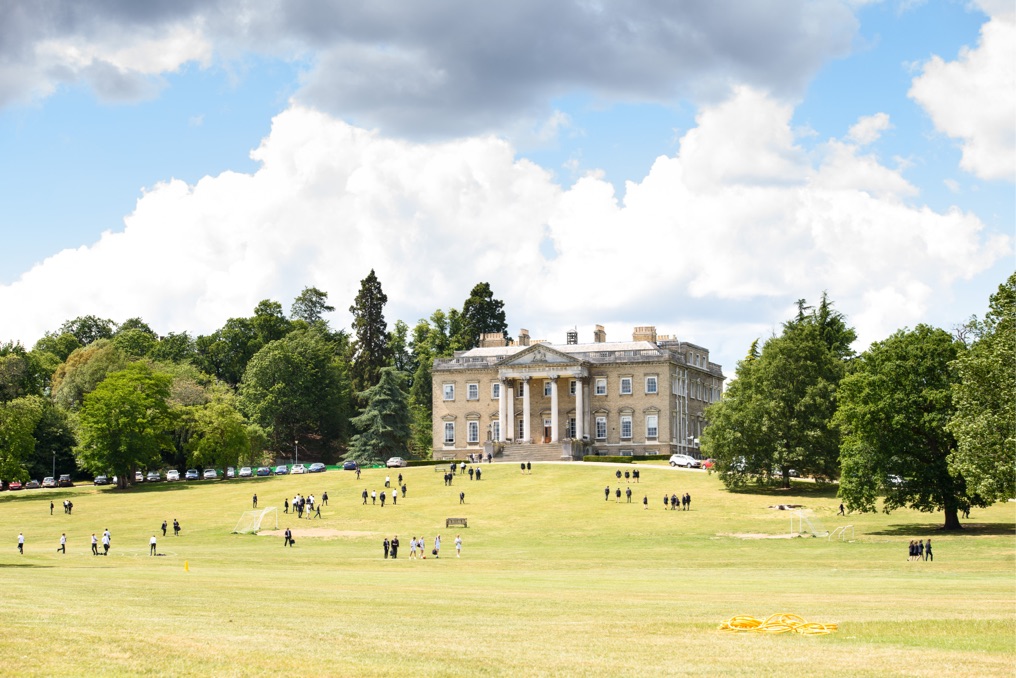Claremont School
Norwood, Class of 1959
Elizabeth (Libby) Visinand-Fernie (Fernie)
The friendships Libby made at Claremont have endured for more than sixty years. She fondly recalls her favourite school memories, her passion for books and the Claremont library, her summer dance, and her year abroad in Geneva studying French:

“I have good and happy memories of my time as a boarder at Claremont. I am above all grateful for the friendships formed then with a number of my classmates which have lasted for over 60 years. If you think of it, we actually spent more time together then than we did with our families.
I loved the mansion, its history, architecture, décor and was aware of the privilege of being at school in such beautiful surroundings.
One thing I did not like was our winter school uniform – a horrible, heavy, dark brown winter coat, brown felt hat, brown sports “shorts/skirts”, it felt like brown everything – for years afterwards I would never wear brown! The summer uniform was OK, pink, blue or green striped dresses, and quite a pretty lightweight fawn-coloured coat, etc.
Teachers I remember particularly well include Miss Cooper, Miss Groser, Miss Ison, Mrs Bailey, Mrs Sexton, Miss Butler (poor Miss Butler trying to teach us Latin with little success – I longed for someone like Mr Chips who would make Latin fun!). I was lucky not to have much difficulty with my studies – apart from maths! – I loved English (especially English lit.), history, geography, French, and science was OK. I was not very sporty – I quite liked the summer sports like netball, swimming (though the water in the pool was generally too cold) and above all tennis, but did not like hockey and lacrosse – being bashed over the head by a lacrosse stick, or bashed on the shins by a hockey stick, were not my idea of fun. Though not very manual, I remember I quite enjoyed the sewing we did on a Saturday morning, including learning to sew on a button, hem, or darn a sock, as well as some embroidery. I remember also going through the tunnel to the art room – though not very good at drawing and painting I enjoyed the classes. We also went through the tunnel to get to the pets’ corner. I had a rabbit and a guinea pig. One girl’s enterprising brother had set up a “business” making flat-pack (shades of Ikea!) light-weight cages out of asbestos sheets, easily assembled and disassembled. We had no inkling at that time that asbestos could cause cancer. My poor little guinea pig died quite young, and I’m sure it was because he gnawed the walls of the cage.
Above all, I was a bookworm, and the library (at that time where Princess Charlotte died in childbirth) was my favourite place. Everything was grist to the mill from comics, teen magazines, Reader’s Digest, to the classics like Austen, Dickens, the two Dumas, R.L. Stevenson, etc., and all sorts in between. I loved historical novels and (a bit nerdy perhaps) would then check how “true” they were in the encyclopedia. I read whenever and wherever I could – a lot of pocket money went on batteries for my torch because I read a lot after lights out. Inevitably from time to time I was caught and had a book confiscated, but I generally had several going at once, or could borrow from one of my friends. In some of the dormitories there were wide windowsills, so in summer when the light lasted long into the evening, I could “save” on batteries by sitting reading on the windowsill. In winter, I’d make a tent by attaching the sheet to the head of the bed, and read under that with my torch.”
“One anecdote of having a book confiscated is quite amusing. One year I was in a fairly small dormitory up on the top floor down a little corridor, with just one dormitory next door. This was occupied by seniors who went to bed later than us. My bed was opposite the door which had a window above it. Conveniently, the light in the corridor shone down on my bed directly, so I arranged with the girls next door not to turn the light out when they went to bed, so I could “save” my torch and use the light, and would turn it off when I had finished. From time to time they forgot and turned the light off. Irritated, I would get up and turn it back on. One night this happened – I had just got back into bed and picked up my book again when I heard a heavy tread in the corridor. The door opened and Miss Uhrland, a German assistant matron with a rather heavy accent asked: “Who turned on the light?” “I did,” said I. “Why?” “Because I was reading”. Result – book confiscated!
I still have a number of my books from those years (I loved and looked after them) particularly a heavily annotated edition of an anthology of 50 poems from 1900 to 1950 entitled ‘This Half Century’, edited by N.L. Clay (Pub.: Wm Heinemann). On the inside cover is inscribed “Elizabeth Fernie, Lower V” and there are pencilled notes on practically every poem, plus a number of doodles! I didn’t normally scribble in my books, but here I was obviously taking assiduous notes during our English lit. lessons (when not doodling!).
One particular memory stands out: there was myxomatosis during the ‘50s so we came across dead rabbits from time to time. We had strict instructions not to touch them, but on one of our winter walks in the woods below the Belvedere we came across a rabbit obviously suffering and not dead. There was discussion about whether to put it out of its misery or not. Some were too squeamish but several of us decided we had to, and hit it on the head with a stout stick. Not nice…I felt bad and could never decide afterwards whether by “putting it out of its misery” we had not in fact added to its misery.
We were taken up to London from time to time, to see a Shakespeare play for example, (at the Old Vic I suppose) or to a CS lecture, and I remember a very special weekend visit to Stratford-on-Avon once where we saw two plays. I was lucky to participate in a trip to Switzerland one Easter holiday. We went to Locarno on the Italian lakes, and visited the region, Isola Bella, Como and Milan. It was lovely but it rained all the time! I was very impressed by the fact that many people there spoke not only Italian, but often French and German as well as English sometimes. Because I was quite good at French, the group often asked me to be the intermediary for them in the shops etc., if the shopkeeper did not speak English.”
“In the 2022 100th anniversary edition of the Annual Review, there is a photo of the 1952 Claremont Summer dance. I remember our own summer dance. We all loved dancing and of course, it was the time of rock and roll, which we all enjoyed and were more or less adept at. One of our classmates was a French girl, Annie K, who was (and still is) a great friend. She had a young friend called Gérard who was studying English in Guildford, and he agreed to come as her partner and bring along a friend as a partner for me. During the evening there was rock and roll music and everyone was jiving more or less successfully, but at some point everyone stopped to watch and applaud the fantastic demonstration Annie and Gérard put on. We were all far outdanced!!
One final thing: I went to Geneva in 1960 for a year to study French. Mrs Bailey was instrumental in this. After leaving Claremont I did a year-long secretarial course and then worked in London. One day Mrs Bailey called me on the ‘phone. She remembered that I was good at French and asked me if I would be interested to go and work for a friend of hers in Geneva. The company had a system of employing a young secretary for a year to work in their mother tongue (one English, one German) and have time off to study French. I grabbed the chance and arrived in Geneva in March 1960 at the age of 19. During that year I met a young Swiss school teacher. At the end of my year at the company I returned to London, but very soon went back to Geneva – and to the boyfriend, found another job as a bilingual secretary, and we married in 1962. My life has been here in Geneva ever since. I have three children who all live here. Sadly, my husband died in 1982. Until retirement in 2006 I worked in the non-governmental sector in Geneva, mainly in communication, as an administrative assistant, editor, proof-reader, and bi-lingual interpreter.”


















